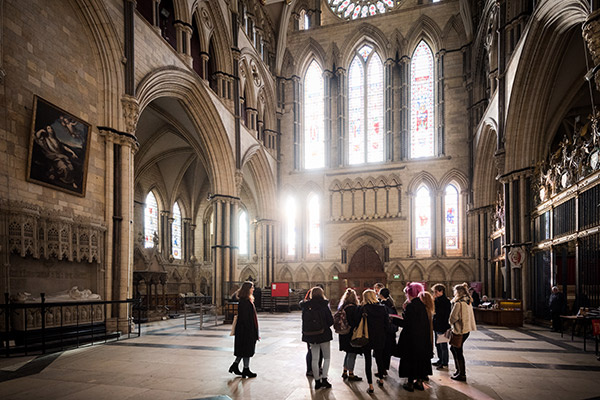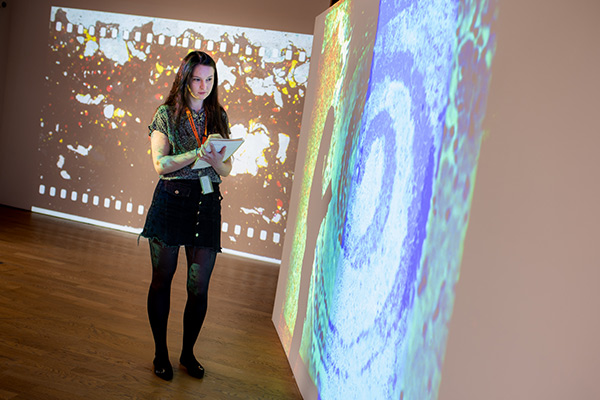View semester dates

BA (Hons) History of Art (with a year abroad)
Gain a comprehensive understanding of art history and architecture. See the world through different eyes.
Year of entry: 2026/27
View semester dates
1st in the UK for history of art research impact and environment
4th in the UK for graduate prospects in history of art, architecture and design
7th in the UK for history of art, architecture and design
Why study history of art (with a year abroad) at York?
Explore an extensive range of modules. You'll learn how to analyse and interpret visual material, consider how and why it was created, and what this tells us about artists and societies. Our modules introduce foundational topics, and you'll then dig deeper with options exploring art in its many forms, from across the globe and from the ancient to the contemporary.
Study or work abroad with one of our international partners. If you choose to study at another university, you'll explore their exciting array of modules. You'll immerse yourself deeply in the cultures and language of another country. This will help you develop key skills to boost your employability and help you prepare for your final year.
Learn beyond the University and make professional connections to encounter objects in different settings. We offer regular trips to cultural institutions across the country, both as part of your course and as an extracurricular. These are a great way to experience the field directly, gain firsthand knowledge and develop professional connections.
Expert staff and collaborative links. We're one of the largest art history departments in the UK, and our staff includes leading researchers and professional curators. We have an exciting range of partnerships in our beautiful heritage city and beyond, including:
- Houses of Parliament
- National Gallery, London
- St Paul’s Cathedral
- Tate
- The Hepworth Wakefield
- York Minster
- York Museums Trust
- Yorkshire Country House Partnership

When I first arrived at the University of York, I didn’t expect to be surrounded by so much art! But as it turns out, art is everywhere you look on campus. Whether it’s in a gallery, outdoors, or even part of the buildings themselves.
Course content
Our course is designed and taught by expert art historians; many are curators with international reputations. In the first year of the course you'll receive a revealing and rigorous introduction to the history of art and architecture. As you progress you'll be able to specialise, choosing your own blend of modules taught by experts in the field and introducing you to the newest and most exciting research and ideas. In the first and second years, you'll also be able to learn a language which can enhance your experience of art history, your experience during your year abroad, and benefit your career. You'll spend your year abroad either studying at one of our partner institutions, or working, or a combination of both.
History of Art is a subject with a strong vocational element that will allow you to develop many transferable skills. We have close relationships with a wide variety of local, national, and international arts and heritage institutions, as well as other third-sector organisations. We also work on art beyond the museum and gallery system, including with partners in country houses, churches and cathedrals, as well as human rights and law enforcement institutions.
Here are just some of our partners:
- York Museums Trust
- York Minster
- Yorkshire Country House partnership
- St Paul’s Cathedral
- Hepworth Wakefield
- Yorkshire Sculpture Park
For more on the Department's diverse partnerships, see York Art History Collaborations.
Year 1
Your first year introduces you to the fundamental concepts and skills you'll need as an art historian.
Core modules
- Art History Now
- Materials of Art and Architecture
- Transmissions and Connections
- The Practices of Art History
- Objects in Focus
Option modules
You will study one option module. Examples can be found below. Some option module combinations may not be possible. The options available to you will be confirmed after you begin your course.
- The Art of Looking
- Learn a language. You can choose from specialist art history language courses or more general language skills.
Academic integrity module
In addition to the above you will also need to complete our online Academic Integrity module.
Year 2
In your second year, you'll be able to explore your own interests from a wide variety of time periods, media, and institutional contexts. For instance, you’ll learn how artworks operate within cultural and heritage organisations, as well as in other types of spaces such as hospitals, churches, or law enforcement units. Through lectures and Problem Based Learning (PBL) activities, students will gain insights into the skills required to tackle real-life challenges in these spaces. You’ll also develop your ability to work independently, design imaginative research strategies to prepare for your dissertation, and gain crucial insight into conducting academic work.
Core modules
Option modules
You will study four option modules. Examples can be found below. Some option module combinations may not be possible. The options available to you will be confirmed after you begin your course.
- Italian for Art History Level 2
- Journeys, Histories, and Methods of Display
- Curating the Dressed Body in Fashion History
- Interwoven: Fashion and Clothing Communities in Art History (1800 - the Present)
- Fashion, Sustainability, and Ethics
- Art Law
- What is Pop Art?
- Art in the USA 1942-1975
- Surrealism: Art and Liberty
- Made in Italy
- The Future is Still Female: Art and Feminism since the 1970s
- How to Be a Critic
- The Emergence of Photography
- Camera South Asia
- Indo-British Art, c.1527-1947
- Cut / Bite / Stamp: The Power of the Printed Image in Eighteenth-Century Britain
- Painting in Eighteenth-Century Britain
- The English Country House
- Three Rogue Architects
- Images as Knowledge
- Material Encounters in Northern Renaissance Art
- Contemplation, Knowledge and Power: Medieval Maps
- The Arts of Italy and the ‘Global Renaissance’
- Art in Renaissance Florence: Materials, Making, Agency
- From Brick into Stone: Islamic Architecture in Anatolia During the Long Thirteenth Century
- Looting, Acquiring, Gifting: The Islamic Art Market and Museums
- Babylon-Berlin: Ancient Art and Modern Museology
- Art and Iconoclasm: The Power of Images
- The First Cities: Art and Architecture of Ancient Mesopotamia
Elective modules
You may be able to replace one option module with an elective module, studying a complementary subject, a language or an interdisciplinary topic.
Year 3
You'll live, study, and potentially work abroad, combining university study with an international vocational opportunity. The department has a number of partners in Europe and China, but you’ll also be able to make use of the university’s partners in the World University Network, and partners beyond the university as well. During the year, you'll study modules on offer at your host institution and you'll pay a reduced fee to York for that year of study. Your assessment will be via two modules, in which you'll write a 2000-word essay, in English, discussing your experience abroad, and assessed by the York department.
Our current international partners
- Lund University, Sweden
- University of Cologne, Germany
- University of Florence, Italy
- University of Leiden, the Netherlands
- University of Paris 1 Panthéon-Sorbonne
- University of Peking, China
- University of Vienna, Austria
Elective modules
You may be able to replace one option module with an elective module, studying a complementary subject, a language or an interdisciplinary topic.
Year 4
In your fourth year, you will focus on your dissertation and continue to explore your own interests from a wide variety of time periods, contexts and media.
Your dissertation will draw on the knowledge and skills you have developed throughout your degree. It will consist of 7,000-8,000 words and represents a year-long, independent research project on a topic that most interests you. You will also choose special subject modules that might either support your dissertation or broaden your horizons in a different direction.
Option modules
You will study four option modules. Examples can be found below. Some option module combinations may not be possible. The options available to you will be confirmed after you begin your course.
- Journeys, Histories, and Methods of Display
- Curating the Dressed Body in Fashion History
- Interwoven: Fashion and Clothing Communities in Art History (1800 - the Present)
- Fashion, Sustainability, and Ethics
- Art Law
- What is Pop Art?
- Art in the USA 1942-1975
- Surrealism: Art and Liberty
- Made in Italy
- The Future is Still Female: Art and Feminism since the 1970s
- How to Be a Critic
- The Emergence of Photography
- Camera South Asia
- Indo-British Art, c.1527-1947
- Cut / Bite / Stamp: The Power of the Printed Image in Eighteenth-Century Britain
- Painting in Eighteenth-Century Britain
- The English Country House
- Three Rogue Architects
- Images as Knowledge
- Material Encounters in Northern Renaissance Art
- Contemplation, Knowledge and Power: Medieval Maps
- The Arts of Italy and the Global Renaissance
- Art in Renaissance Florence: Materials, Making, Agency
- From Brick into Stone: Islamic Architecture in Anatolia During the Long Thirteenth Century
- Looting, Acquiring, Gifting: The Islamic Art Market and Museums
- Babylon-Berlin: Ancient Art and Modern Museology
- Art and Iconoclasm: The Power of Images
- The First Cities: Art and Architecture of Ancient Mesopotamia
Our modules may change to reflect the latest academic thinking and expertise of our staff, and in line with Department/School academic planning.
Learning outcomes
Every course at York has been designed to provide clear and ambitious learning outcomes. These learning outcomes give you an understanding of what you will be able to do at the end of the course. We develop each course by designing modules that grow your abilities towards the learning outcomes and help you to explain what you can offer to employers. Find out more about our approach to teaching and learning.
Learning outcomes for this course
- Deploy a broad knowledge of varied types of art and architecture from diverse periods and places, together with understanding of their historical and cultural contexts, with in-depth critical understanding of more than one subfield.
- When encountering new visual material either first-hand or in reproduction, apply high-level descriptive and observational skills, develop critical visual analysis drawing upon an appropriate range of methodological approaches, and identify relevant sources for further research.
- Communicate complex ideas effectively, both orally and in writing, well-supported by visual material where required, at varied lengths and registers appropriate to the context and intended audience.
- Confront and interrogate widely-held assumptions, understand how interpretations of culture and its contexts have changed over time both incrementally and in more radical paradigm shifts, and continue to engage critically with future changes in ways of thinking.
- Carry out an original and independent investigative project from beginning to end: identify and assemble relevant primary material, develop relevant methodologies for interpretation, consult significant source materials and experts, manage time in an appropriate framework, and complete the project to a deadline in the required format.
- Work both independently and as an effective team member in pursuit of an objective, exercising initiative and leadership when appropriate.
- Evaluate how artworks are understood, employed, and valued in various institutions both within and beyond the heritage sector.
- For History of Art with a Year Abroad only. Adapt successfully to unfamiliar contexts and take advantage of the intellectual and wider benefits of intercultural experiences.
Fees and funding
The fees and funding information here is for students starting in the 2026/27 academic year.
If you take a year abroad or year in industry you'll pay a reduced rate of fees for that year.
Annual tuition fees
| UK (home) | International and EU |
|---|---|
| £9,535 (TBC) | £26,900 |
The UK government has announced its intention to increase tuition fees from £9,535 to £9,790 for the 2026/27 academic year. We expect this to apply to new UK (home) undergraduate students starting their studies in September 2026.
UK (home) or international fees?
The level of fee that you will be asked to pay depends on whether you're classed as a UK (home) or international student. Check your fee status.
Fees for subsequent years
- UK (home) fees may increase within the government fee cap in subsequent academic years. We will notify you of any increase as soon as we can.
- International fees are subject to increase in subsequent years in line with the prevailing Consumer Price Index (CPI) inflation rate (up to a maximum of 10%).
More information
For more information about tuition fees, any reduced fees for study abroad and work placement years, scholarships, tuition fee loans, maintenance loans and living costs see undergraduate fees and funding.
Additional costs
Some of the modules you can choose from may include associated field trips to allow you to visit art and architecture. Financial support with transport is usually provided.
Your third year will be spent abroad with one of our partner institutions and you will pay a reduced fee to York for that year of study.
Funding
We'll confirm more funding opportunities for students joining us in 2026/27 throughout the year.

Studying here allows you to make your engagement with History of Art as personal as you’d like, with incredible opportunities to travel and develop outside your course.
York, Oxford, Cambridge, Imperial
Just four UK universities are rated Gold for teaching and top ten for research* in the latest national assessment exercises.
* Awarded joint 10th in the Times Higher Education ranking of the Research Excellence Framework 2021.
Teaching and assessment
You’ll study and learn with academics who are active researchers, experts in their field and have a passion for their subjects. Our approach to teaching will provide you with the knowledge, opportunities, and support you need to grow and succeed in a global workplace. Find out more about our approach to teaching and learning.
Teaching format
We believe that you learn best in an interactive and stimulating environment where you can discuss ideas with experts and fellow students, and develop your capacity for critical thought. Most of your teaching will be in small groups, supported by a combination of lectures, seminars, field trips, individual tutorials and online activities.
You'll be taught by the best: our art historians are curators with serious international reputations. Our internationally-renowned academics will challenge you to think critically about periods, places, images and ideas - and the scholarship they’ve inspired.
We believe in the importance of studying art and architecture in the original. So many modules include visits to collections across the UK. Recent destinations have included Cambridge, Canterbury, Edinburgh, Manchester and London.
Timetabled activities
In your first year, you can expect:
| Lectures | 1-2 hours per week |
|---|---|
| Seminars | 6 hours per week |
| Tutorials | 1-2 hours per term |
| Workshops | 1-2 hours per week |
These figures are representative of a typical week. Your contact hours will vary throughout the year due to your module choices, non-compulsory classes, exam periods and changes to scheduled activities.
Outside your timetabled hours, you'll study independently. This may include preparation for classes, follow-up work, wider reading, practice completion of assessment tasks, or revision.
In the UK, full-time students are expected to spend 1,200 hours a year learning. That's about 40 hours of classes and independent study each week during semesters. Everyone learns at a different rate, so the number of hours you spend on independent study will be different to other students on your course.
Teaching location
You will be based in the Department of History of Art which is on Campus West.
Your contact hours will be divided between Vanbrugh College and Heslington Hall on Campus West.
About our campus
Our beautiful green campus offers a student-friendly setting in which to live and study, within easy reach of the action in the city centre. It's easy to get around - everything is within walking or pedalling distance, or you can use the fast and frequent bus service. Take a campus tour.
Assessment and feedback
We use varied assessments to develop and evaluate your different strengths. Our assessments include:
- Essays and other written assignments
- A 7,000-8,000-word research dissertation
You'll receive regular feedback on your assessment. You'll get verbal and written advice on your work in one-to-one tutorials. You'll also be able to discuss your work with your personal supervisor, who will help support you throughout your degree.

I attended field trips every two weeks during my first term. The trips gave me a better understanding of conservation, heritage, curatorial practices, and the way that art shapes the places we live in.
Careers and skills
You'll gain key employability skills throughout the course. You'll also go on field trips to see these skills in professional settings. Our alumni are art educators, journalists, curators, auctioneers and valuers. We also have students who work in law, public administration, social work and education.
Many graduates take the first step of their careers on prestigious internships - recently at MoMA and the Guggenheim in Venice. Others go on to postgraduate study here and at other top universities. You can make use of our dedicated careers officer to explore opportunities and support you when you need it.
Career opportunities
- Academic careers
- Antiques Dealer
- Archivist
- Art Consultant
- Art practitioner
- Broadcaster,
- Charity Fundraiser
- Conservation Officer
- Curator
- Editor
- Freelance writer
- Gallery Director
- Learning Officer
Transferable skills
- Analytical skills
- Research
- Interpersonal skills
- Presenting and communicating
- Persuasive writing
- Independent thinking
- Time management
- Problem-solving
Entry requirements
| Qualification | Typical offer |
|---|---|
| A levels | AAB You do not need an A level in History of Art. |
| Access to Higher Education Diploma | Obtain Access to HE Diploma with 36 credits at Distinction and 9 credits at Merit or higher |
| BTEC National Extended Diploma | DDD |
| European Baccalaureate | 80% |
| International Baccalaureate | 35 points |
| T levels | Distinction overall including grade A in the Core T Level subjects in Accounting; Design and Development for Engineering and Manufacturing; Design, Surveying and Planning for Construction; Digital Business Services; Digital Production, Design and Development; Digital Support and Services; Engineering, Manufacturing, Processing and Control; Finance; Health; Healthcare Science; Legal Services; Maintenance, Installation and Repair for Engineering and Manufacturing; Management and Administration; Marketing; Science |
| Scottish Highers / Advanced Highers | Scottish Highers - AABBB Advanced Highers - not required for entry We may also be able to consider three Advanced Highers or a combination of Highers and Advanced Highers, where an applicant does not meet the grade requirement through Highers alone. Please contact us to discuss your qualifications. |
| UAL Level 3 Extended Diploma in Art and Design | Distinction. We will also consider other qualifications from the University of the Arts London in different specialisms, at Level 3 or higher. |
| International foundation programme | Foundation Certificate from our International Pathway College or an appropriate alternative. |
| Other international qualifications | Equivalent qualifications from your country |
Alternative offers
Meeting the following additional criteria may qualify you for an alternative offer.
| Criteria | Adjustment |
|---|---|
| Widening participation | BBC This is conditional upon successful completion of the WP programme including the YorJourney module (Black Access Programme, Next Step York) or successful completion of Realising Opportunities More about widening participation. |
| Contextual offer | BBB |
| EPQ | If you achieve C or higher in the EPQ, you may be eligible for an alternative offer up to one A level grade (or equivalent) below our typical offer. |
| Core Maths | If you achieve B or higher in Core Maths, you may be eligible for an alternative offer up to one A level grade (or equivalent) below our typical offer. |
| MOOCs | If you successfully complete our online course Modern Sculpture: An Introduction to History of Art, you may be eligible for an alternative offer up to one A level grade (or equivalent) below our typical offer. Details about how to evidence completion of the MOOC will be sent in your offer letter. Please note: you do not need to pay for the certificate. More about MOOCs. |
English language
If English isn't your first language you may need to provide evidence of your English language ability. We accept the following qualifications:
| Qualification | Minimum requirement |
|---|---|
| IELTS (Academic) | 6.5, with a minimum of 6.0 in each component |
| IB English | A score of 4 in English A or 5 in English B (Higher Level or Standard Level) |
| Cambridge CEFR | 176, with a minimum of 169 in each component |
| Oxford ELLT | 7, with a minimum of 6 in each component |
| Oxford Test of English Advanced | 136, with a minimum of 126 in each component |
| Duolingo | Integrated subscores: 120 overall, with a minimum of 105 in each component |
| GCSE/IGCSE/O level English Language (as a first or second language) | Grade C / Grade 4 |
| LanguageCert SELT | B2 with a minimum score of 33/50 in each component |
| LanguageCert Academic | B2 with a minimum score of 33/50 in each component |
| Kaplan Test of English Language | 478 Main Flight score with 444 in each component |
| Skills for English | B2: Merit overall, with Pass with Merit in each component |
| PTE Academic | 61, with a minimum of 55 in each component |
| TOEFL | 87 overall, with a minimum of 21 in each component (taken before January 2026) 4.5 with 5 in Listening and 4.5 in each other component (taken after January 2026) |
| Trinity ISE III | Merit in all components |
| Other English language qualifications | We also accept other English Language qualifications, including various school-leaving certificates. |
For more information see our undergraduate English language requirements.
If you haven't met our English language requirements
You may be eligible for one of our pre-sessional English language courses. These courses will provide you with the level of English needed to meet the conditions of your offer.
The length of course you need to take depends on your current English language test scores and how much you need to improve to reach our English language requirements.
After you've accepted your offer to study at York, we'll confirm which pre-sessional course you should apply to via You@York.
Next steps
Department
Discover York









